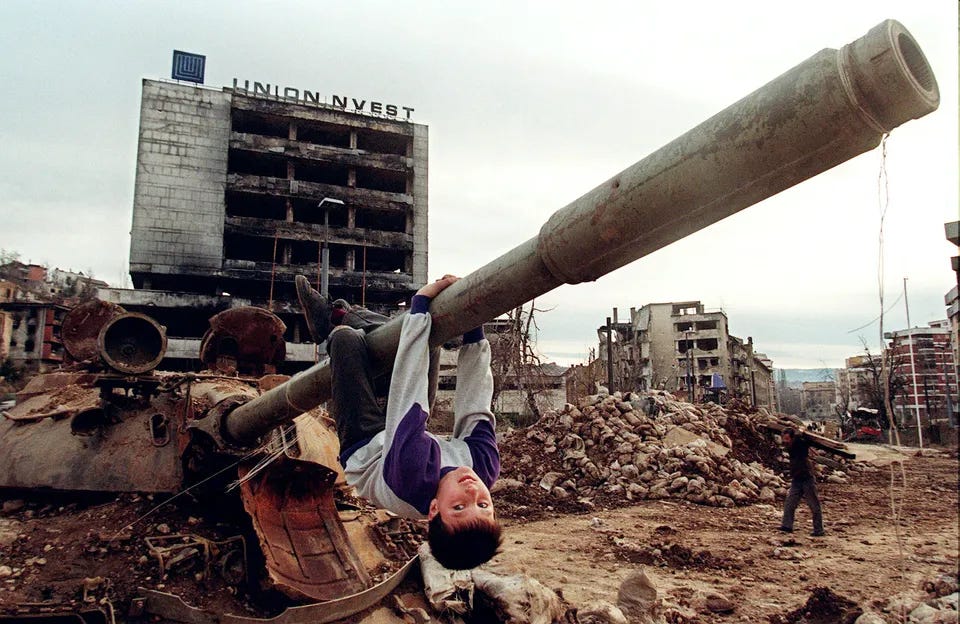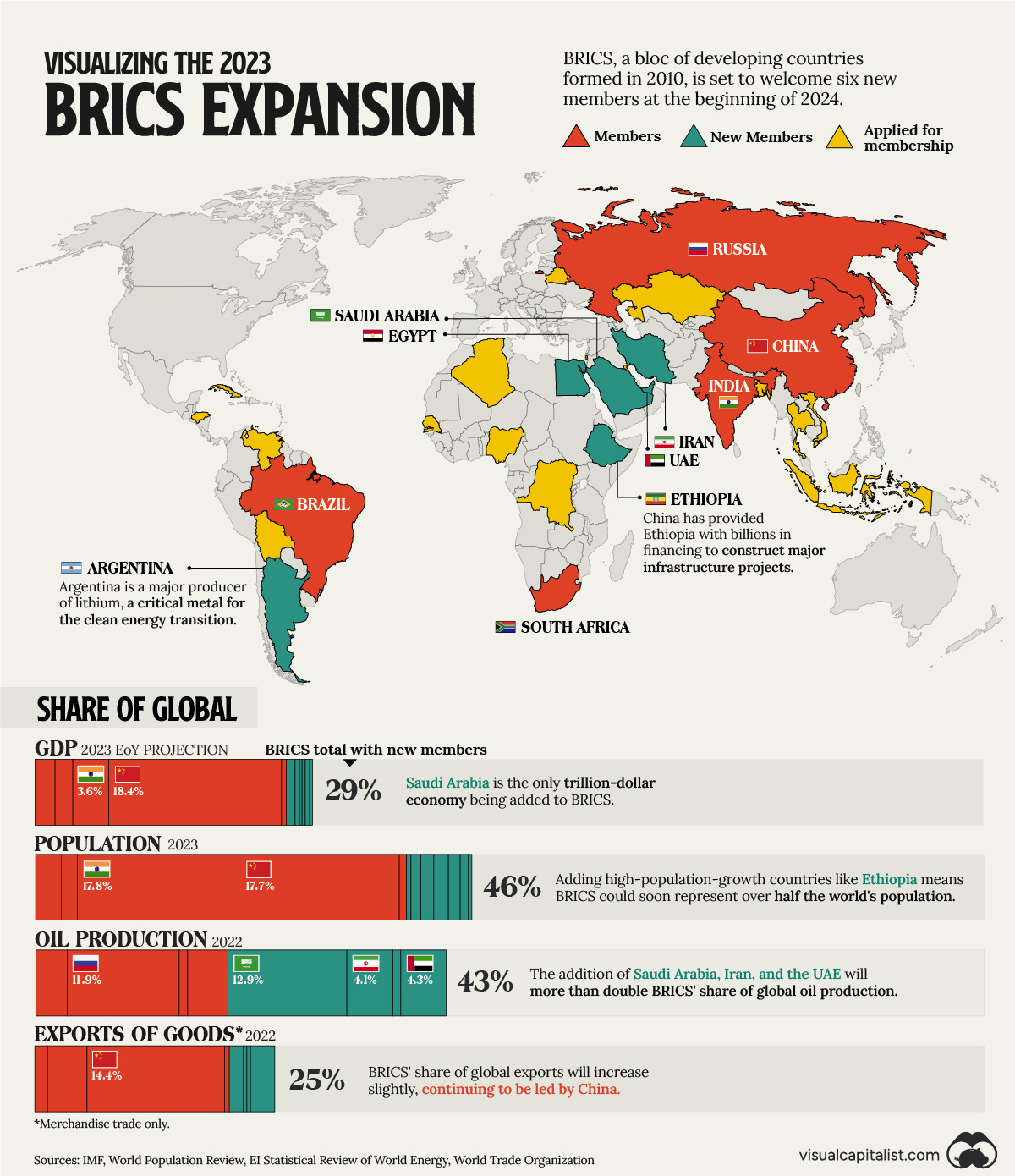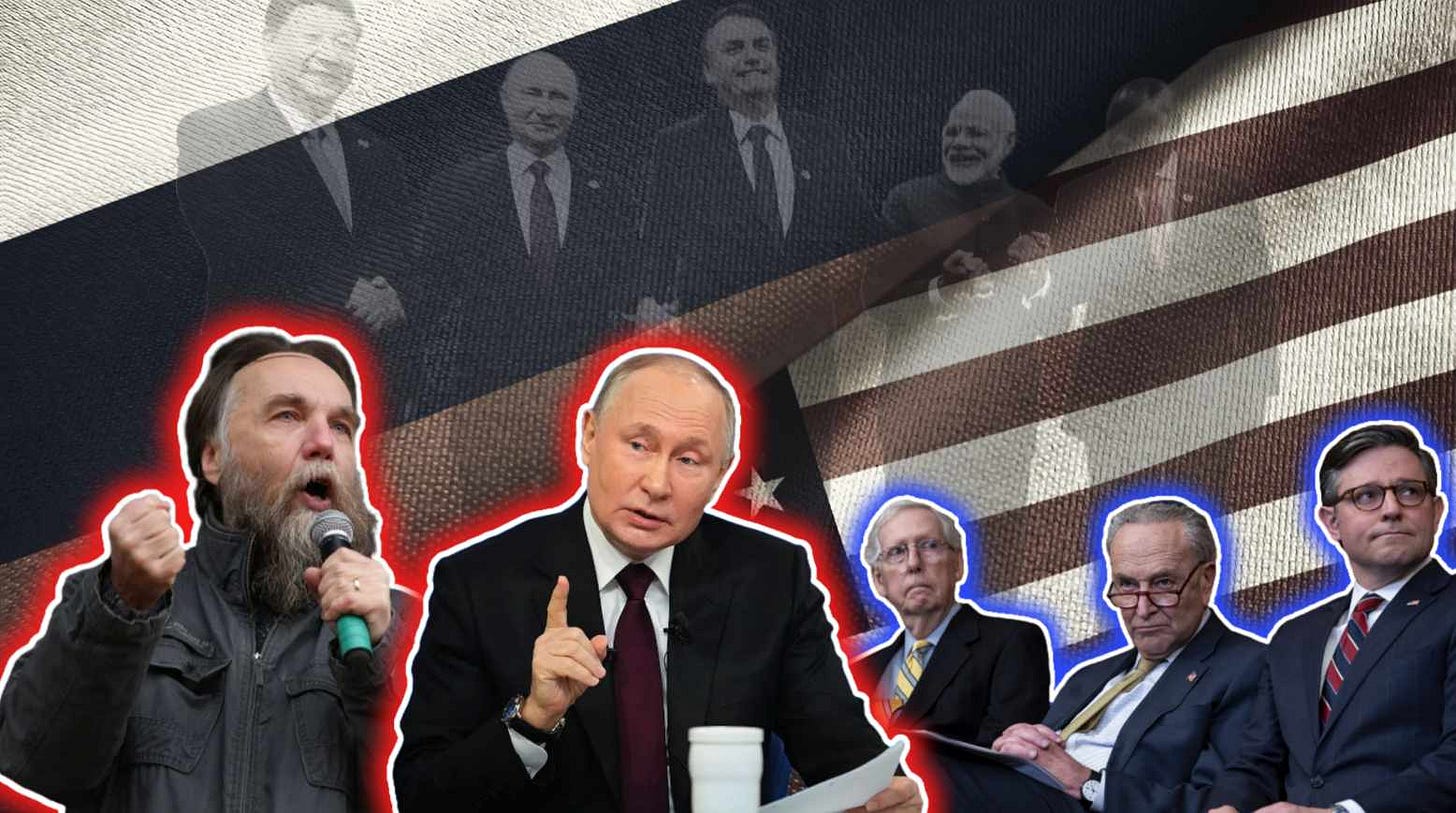Multipolarity and the West
The Kremlin's civilizational worldview, the rise of multipolarity, and the war for the soul of the West
Today’s media landscape is nearly indistinguishable from the sci-fi flicks of the 1980s in which breaking news is broadcast directly into your brain. So avoiding the constant stream of takes on the Tucker-Putin interview has been nearly impossible. Before it had even concluded, traditional media pundits and politicians had released numerous statements overflowing with the hyperbole and brinkmanship we’ve come to expect from Western politicians and elites - and of course a total assault on the character of Tucker Carlson for having the audacity to interview a world leader. Simultaneously an army of bot accounts tried to discredit every word as disinformation - with disinformation of their own, of course. The average Joe was left thinking, “I wish our president was even half as conscious and articulate as Putin,” or simply entertained by the storm of memes which followed.
Western elites despise Putin and yet he is increasingly popular with the working class, Gen Z and traditionally minded Americans. The world is clearly changing, and those in charge are trying desperately to maintain their grip on power. I mention the Tucker-Putin interview not to tell you what you already know - that the world is changing - or to give a commentary as to the accuracy of this or that. It highlights the Civilizational worldview which underpins the modern multipolar world which Americans are waking up to, and that’s a conversation that needs to be had.
First, we need to define Multipolarity, and what is meant by the notion of a multipolar world.
Multipolarity and resentment abroad
In a nutshell multipolarity is the idea that there should be multiple competing major powers in the world - as opposed to the unipolar American hegemony of the last 34 years, or the bipolar world which preceded it. In this way, there would allow a balance between major centers of power. Smaller nation-states would have a choice of who to align with based on their own cultural, economic, and military needs without being denied access to economic and trade incentives as a result. This would allow them to better preserve their own cultures, political and economic systems, resulting in a more vibrant and diverse planet- as opposed to a bunch of clones of America.
This notion didn’t come out of nowhere.
Since the collapse of the USSR, the world has been in a unique situation in which one power, the United States, has ruled the world. One ring to rule them all so to speak. Its military and economic might have allowed it to all but force its will on others. Countries who defy American “suggested” alliances and trade deals, social reforms, etc.. face the cutting off of their access to financial assets, international trade, or as has happened far too often, direct military action - most often in flagrant violation of international law.
Unipolarity has been backed up by a web of international bodies created by the US government and its European satellites These international bodies issue rulings and policies which affect everyone, all but stripping other nations of their sovereignty and self-determination - backed always by the might of the US Military.
These organizations, of course, only ever seem to target America’s enemies, or those countries who have somehow refused American overtures; any ruling which manages to get through against the United States is rejected by the US government with no recourse for those bringing the complaint. We’ve seen this play out repeatedly during the 21st century.
The US faced no consequences for its illegal invasion of Iraq, or the illegal bombing of Sarajevo and elsewhere during the Yugoslav wars. We fabricated reports to justify both invasion of Iraq, we did everything and more than what Russia has done in Ukraine. But only Russia is facing consequences, when we ourselves set the precedent. Our security services topple governments at will: Ukraine, Georgia, Libya, Serbia, the list goes on. We subvert elections across the globe - even in those of our allies - with no consequence.

As we’ve stumbled across the globe like a bull in a china shop, that globe has become increasingly resentful of the Pax Americana. People around the world are tired of their institutions and culture being undermined as we try to spread the gospel of rainbow secularism down their throats with a puritanical zeal - going so far as to cut off foreign aid or initiate a color revolution if they don’t submit to our social agenda - as happened recently in Serbia.1
This has led to unaligned powers searching for a means to form alternative global system. Institutions such as BRICS are instrumental in pulling this off. This is only possible because China has now surpassed the US both economically and militarily, Russia is resurgent,2 India is mobilizing its massive population and natural resources to assert itself, and they have determined to establish themselves as global centers of power, united in a pact of mutual benefit and welcoming all those willing to participate.
One may ask why this would not be simply a return to the tension and spending wars of the Cold War era. This is, at its core, a philosophical question. Anytime you have two powers there is dialectical tension between them. You can look at the poles of a magnet for a perfect example of this. By introducing additional powers, this dialectical tension is broken, the two cannot remain to focused on one another that they fail to look at the additional power. We see this in the Holy Trinity. Thus, by having a plurality of political power centers, this tension is avoided.
This is not utopianism, there is no expectation that war will never break out, but we avoid hegemony in which one state is able to subjugate the rest economically, militarily, politically, and culturally.
Resentment at home
Many in the West still believe in the universality of their values, they believe the superiority of democracy over other modes of governance is self-evident. This is not the case, and our refusal to enter into a generation justification of its merits has resulted in a population who prefers to gaslight and insult anyone who questions the value of liberal democracy instead of engaging in a respectful and reasonable dialogue.
The Establishment continues to tell us that democracy is at stake, but democracy in their eyes resembles something out of the mind of George Orwell more and more. This becomes ever more true as Western elites lose their grasp on control, and American hegemony comes to an end. Anything resembling representative democracy has long vanished from the halls of American government, replaced by multiple layers of oligarchy and bureaucracy in which no one really knows who is in charge but its certainly not the president - as Vladimir Vladimirovich pointed out.
The younger generation of Americans - and those more traditionally minded - recognize this and resent the Washington Establishment for its consistent divergence from the best interests and will of the people, its smug elitism. They are reengaging with history, philosophy, and literature in order to make sense of the world, to organize and meet the challenges ahead. They are tired of the shallow, decadent consumerist culture in which everything is an ad or slogan - especially from our politicians.
Western elites are repulsed, horrified by all of this, and have unleashed the American media and intelligence apparatus to restore order, to keep our eyes glued to our screens and brand anyone who looks up as a white/christian nationalist, Neo-fascist, far-right, et al... But their pearl clutching means nothing to those who see their hypocrisy. This generation then sees a leader who, unlike their own, actually puts his nation first; who is willing and more than capable of engaging in a two hour long televised interview; who speaks of history, of faith and tradition, or morals and ethics, and are instantly drawn to him.
But a word of caution to my zealous young friends: Vladimir Putin is not your friend.
We have to remember that just because Putin challenges the globalist agenda does not necessarily make him an ally. Putin is guided by realpolitik, he is a pragmatist and will always put his nation's interests above anything else.3 While this is an admirable trait in a leader which we wish to guide our own leaders, it can only ever be a starting point for cautious cooperation in the emerging environment - and we will have to cooperate.
Civilizational Conflict
Tucker Carlson - like many watching - could not understand why Vladimir Putin felt it necessary to run through the last thousand years of Russian history. Many commentators have jumped the gun in thinking that he was doing so simply to justify the war in Ukraine - though it is perhaps that in part.
Most Americans have little to no understanding of world history prior to World War II - after all, our attention span is about 45 seconds - and because of this they are desperately ignorant of the long history of the Russian people and the incursions of Roman Catholic powers into their lands.
Russia’s entire existence has been one of Western powers trying to prevent it from reuniting its peoples after its kingdom was destroyed by the Mongols. Western powers have consistently intervened, undermined the Russian government, and rewritten historical accounts to deligitimize Russian claims. We see this in the West’s renaming of many Russian communities as “Ruthenian” and “Ukrainian” during the 18 and 19th centuries respectively. This occured only after decades to centuries long - and exceedingly brutal - campaigns of Polonization and forced conversion to Roman Catholicism.
It would not be out of bounds to trace the root of the conflict even further back to the days of the Eastern Roman Empire and the time of Charlemagne. But we will cover the struggle of the Greek East and Latin West another time - with emphasis on Enlightenment historians rewriting history to usurp the very Romanness of the East. Suffice to say this conflict has taken on many forms over the centuries, transcending regimes and ideologies but remains the same in spite of the shifting sands of time. The Russians therefore, see this not as a new conflict between two modern nation states, or two modern blocs of nations.
These nations and blocs are merely the latest iteration of a much larger and longer civilizational struggle between the Catholic and now Secular Atlanticist civilization of the West, and the Orthodox Eurasian civilization of the East. This civilizational interpretation of history is what undergirds Russian foreign policy.
According to Alexander Dugin4 there are seven major civilizations. The first four are well established:
Russia/Eurasia - Russia, the Balkans, and Caucuses. ie., the nominally Orthodox Christian states.
The West - the United States, Canada, Australia, Western Europe
Great China (Zhōngguó)
Greater India
The remaining three are not politically united, but have the potential to be so.
Trans-Saharan Africa - the various Black states of Africa. We see these beginning to unite in larger trade and security blocs as they complete the process of throwing off Western colonial rule.
The Islamic World - united religiously, but not politically. They have waged a largely cultural war against the West since the opening of the 21st century. They have huge potential if they were to unite. Though, we and our allies ensure that won’t happen.
Latin America
You might have picked up on the fact that the major players of these civilizations have become increasingly integrated economically through BRICS, which now contains major and secondary partners from six of the seven civilizations who have agreed to no longer accept loans or conduct intra-bloc transactions in USD. This alone would be little cause for concern, but coupled with the Belt and Road initiatives, advances in CBDT and other fintech, as well as the strength of the Russian and Chinese arms industries, the multipolar world has arrived. Considering six of seven civilizations have united in this effort against the global Western hegemony, multipolarity is here to stay.

The state and fate of the West
The West has chosen to reject the whole multipolar project, sewing conflict and intrigue around the world - see Ukraine, Gaza, Serbia. It’s heartbreaking to watch, even more so to know your tax dollars are funding it. And the thing is, multipolarity isn’t necessarily a bad thing for the West. Sure, a powerful China or resurgent Russia may not directly serve Western interests, but rivals play a crucial role in fostering internal reflection and self-improvement - which the West desperately needs.
The West has systematically deconstructed its own culture over the last century, and at an ever-increasing rate. I will not get into the historical/material causes of this degradation, but I will touch on the immaterial causes, the powers and principalities which have gutted Western Christianity and civilization. St. John of Kronstadt once said that the spirit of the age would soon manifest in an epidemic of distraction.
His words have proven prophetic.
Today we are perpetually distracted, doom scrolling on our devices, streaming on our televisions, even our forms of recreation are little more than paid distraction. Modern man, especially in the West, consumes and consumes to distract himself from the death of his soul. The true American religion is Consumerism, which has become the very soul and intellect of the American people. Marketing strategies permeate dating and relationships, education, entertainment, our politics, and has become our primary mode of communication and decision making.
As Richard Weaver notes in Ideas have Consequences, “for more than four centuries Western man has been his own priest and professor of ethics.” This has led to a society of self-righteous moral idiots who bark out sound bites approved by the ministry of information like rapid dogs. Our society has become based on lies, lies which everyone repeats even though they know them to be false.
But there’s still time as the West has not yet fallen completely.
There are seemingly two Wests battling for the soul of the whole: the decadent debauched West of the Globalist Establishment, and the Traditional West which seeks to maintain continuity with and to honor the collective sacrifices of its forefathers. And we should honor their sacrifices.
But the West must confront its identity crisis and reevaluate its principles if it's going to survive its fall from grace. It is a battle to determine whether or not we wish to live in the warm and enduring light of Truth, or by lies, in the darkness of falsehood. We must, like Solzhenitsyn, cry out “not through me!... Even if all is covered by lies, even if all is under their rule, let us resist in the smallest way: not through me!”
In Closing
The changing world around us and the rise of multipolarity should serve as a catalyst for introspection in the West. Afterall, it’s not that the world hates us, but they do hate what we’ve become. As the old saying goes, absolute power corrupts absolutely.
Alexander Dugin recently said that “the real victory of multipolarity will not be the defeat of the collective West but its salvation, its return to its own — Western — traditional (not perverted) values, to its culture (not to cancel culture), to its classical Greco-Roman, Christian roots.”
Politics are merely a reflection of one’s inner life, the application of philosophy to the organization of human affairs. We must now determine, as a civilization, whether that guiding philosophy is to be composed of decadence and depravity, or an ascent to the ideal forms of Truth, Beauty, and Charity. It's time to reassess our values, confront our shortcomings, and strive for a future built on wisdom and integrity rather than short-term expediency.
Fortunately their security forces were able to get the situation under control.
While resurgent, Russia is not likely to become a world power. They face serious demographic and economic challenges and struggle to even play the role of regional power at the moment.
Unfortunately the United States, the birthplace of pragmatism, has long since taken on a political doctrine of emotionalism, a doctrine of instant gratification.
Alexander Dugin is the most prominent political philosopher in post-soviet Russia. He has previously served as an advisor to Vladimir Putin, and is currently the head of the Department of Philosophy at Moscow University.






You don't want to find out how much a "Caliphate" concept is rightfully feared.
- I live in a muslim majority country